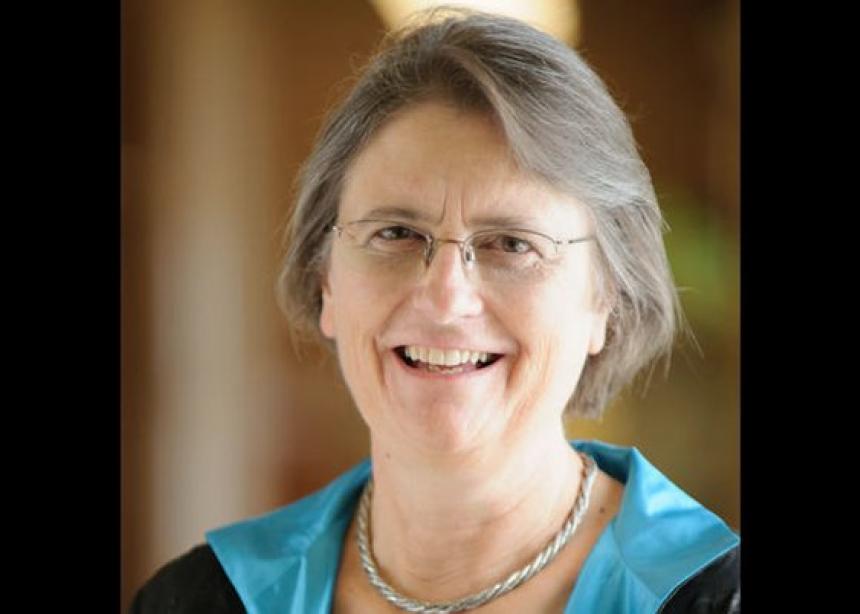Excerpt from MHEA vision statement Sara is focusing on: These schools form graduates who understand that the professional expression of their vocation will require deep roots in a living faith. Engaging the world’s toughest problems requires graduates to be grounded in the love of God and joyfully aligned with God’s reconciling mission in the world.
Life is hard. People who step up as leaders must do hard things, often with little confidence that things will work out. It is our commitment as leaders of Mennonite Church USA’s colleges, universities and seminaries to invite our students to cultivate a living faith so when they step up as leaders to engage some of the world’s toughest problems, rather than being undone by hard things, they will be freed from paralyzing fear.
And the problems we encounter everywhere we look are tough. There are dwindling numbers in many congregations and denominations. Institutions that have been vital to our well-being are increasingly fragile and financially strapped. In some cases, there’s a breakdown of trust between our schools and the communities we serve. Calamities threaten us all in ways that seem unprecedented—such as climate change, desperate peoples forced to migrate, racialized violence, polarized fracturing of our faith communities. Engaging with these tough problems requires leaders to be deeply rooted in a living faith.
A living faith is what freed me to step up close to nine years ago to lead Anabaptist Mennonite Biblical Seminary in Elkhart, Indiana. With great reservation, I agreed to take the next step at each point in the presidential search process though I knew there was no way I would accept the job, and assured family, close friends and supervisors that I would not. In my mind, it was far too costly. (Read the fuller story here on page 59.)
Meanwhile, in my own spirit, I was deeply disquieted. Strange dreams showed up that I lived with for days before they began to open themselves to me. Biblical stories of call drew me in with new urgency. I often awoke at 4:30 a.m. or earlier and couldn’t wait to light a candle and sink into prayer, holding on for dear life, because the ground was shifting beneath me. The choral music of the Russian Orthodox Church—with sacred masterpieces from Rachmaninov, Rimsky-Korsakov, Tchaikovsky and others—held me in their deep harmonies when I had no words, morning after morning. I’ve never felt so inexorably led step by step, in a direction I resisted with every fiber of my being.
Walter Brueggemann’s book of prayers, Awed to Heaven, Rooted in Earth, became an anchor for me. Here is an excerpt that broke me wide open:
We arrange our lives as best we can,
to keep your holiness at bay,
Safe, virtuous, settled…
And then you —
you and your dreams,
you and your visions,
you and your purposes,
you and your commands…
We find your holiness not at bay,
but probing, pervading, insisting, demanding.
And we yield, sometimes gladly, sometimes resentfully, sometimes late…or soon.
We yield because you, beyond us, are our God.
We are your creatures met by your holiness,
by your holiness made our true selves.
And we yield.
I don’t easily yield. I resist doing anything out of a sense of duty. Like most of us, I’m well-schooled in self-preservation. But this time it was different. I don’t know if it’s the weathering that comes with age, or if it’s surviving enough wrenching personal experiences, or if it’s learning to trust despite the vulnerability of any given moment—whatever it is, I have over time developed more solid footing in the love of God. More and more often I remember that my work isn’t about me, or any of us individually.
Of course it is, because God created and calls us each by name.
But what we’re really about is the mission of God in the world to reconcile all things. That’s what fills me with joy, and courage. It’s about the great God of the heavens who comes near to us with tender love, forgiveness and justice for all. It’s about Jesus.
I accepted the call to leadership at AMBS as a sacred trust, joining a team of extraordinarily gifted, spiritually mature, theologically rooted persons who find great fulfillment in educating leaders who are prepared to engage the world’s toughest problems because they are solidly grounded in the love of God and joyfully aligned with God’s mission to reconcile all things.
When we comprehend that we are called to serve God’s mission to reconcile all things, we will be ready to put everything at risk for the love of God, the source and sinew of all that makes life good. There is a qualitative difference between marketing hype and the real deal. Real people who understand why grounding in the love of God matters to everything we do will move beyond anxiety, defensiveness, turf protection and polarizing contestation to become leaders who champion human flourishing in all the communities where we choose to live and serve.
Sara Wenger Shenk is president of Anabaptist Mennonite Biblical Seminary in Elkhart, Ind. This blog post originally appeared on The Mennonite's website as part of a seven-part series by the presidents of Mennonite Church USA higher education institutions.



Comments
Sara Wenger Shenk's blog in the Canadian Mennonite, June 6, reflects perfectly her character and wisdom. She has been a superb leader of AMBS, and her contributions to Mennonite theological education are profound. She exemplifies, to use her words, "the real deal."
Add new comment
Canadian Mennonite invites comments and encourages constructive discussion about our content. Actual full names (first and last) are required. Comments are moderated and may be edited. They will not appear online until approved and will be posted during business hours. Some comments may be reproduced in print.